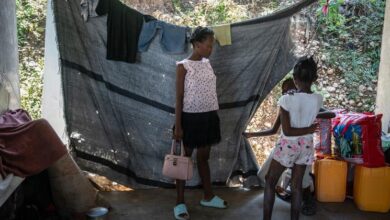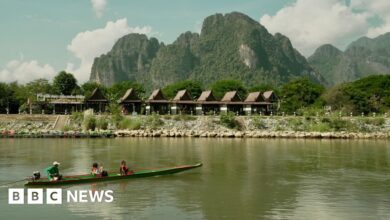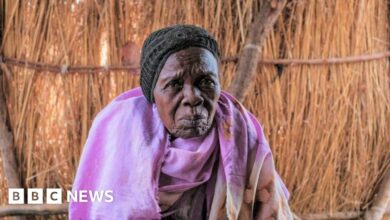Venezuela’s economy is based on oil.
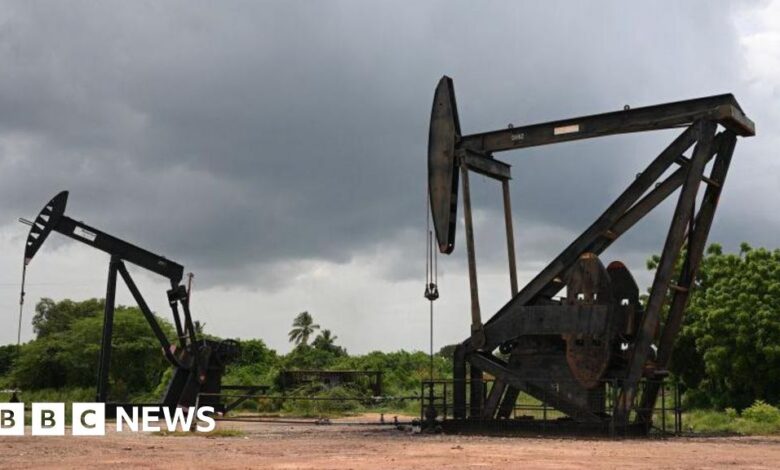
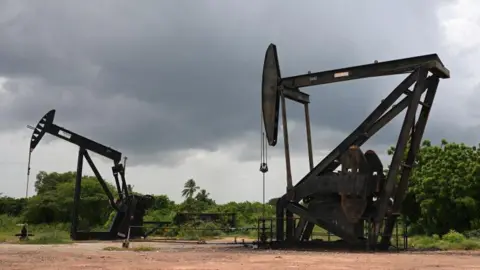 AFP
AFPVenezuela’s crumbling economy is one of the key battlegrounds in Sunday’s presidential election, as President Nicolás Maduro hopes to convince voters that the country has turned the corner after years of conflict.
The outlook is looking brighter, thanks to his recent efforts to lower the cost of living. In February, Venezuela finally said goodbye to its rampant hyperinflation, which saw prices rise by more than 400,000% a year in 2019.
Annual inflation is now more easily controlled but remains high at around 50%.
Mr Maduro is keen to take credit for the drop, saying it shows he has the “right policy”.
Unfortunately, however, those policies have done nothing to address the economy’s underlying structural problems — primarily the economy’s long-standing dependence on oil, to the detriment of other sectors.
“Since its discovery in the country in the 1920s, oil has taken Venezuela on an exciting but dangerous ride of boom and bust,” according to the Council on Foreign Relations.
Now, opponents of President Maduro are pinning their hopes of economic recovery on a change of leadership and a fresh start under his election rival, Edmundo González.
“An opposition victory would lead to a reopening of Venezuela’s trade and financial ties with the rest of the world,” said Jason Tuvey, deputy director of emerging markets economics at Capital Economics.
It would also mean an end to US economic sanctions imposed after Mr Maduro’s victory in the 2018 presidential election, which were widely criticised as neither free nor fair.
These have made it difficult for state oil company PDVSA to sell crude internationally, forcing it to turn to black market deals at huge discounts.
But Mr Tuvey warned that reversing the economic collapse of the past decade would be a difficult task, given the huge investment needed to boost oil production and the approaching peak in oil demand.
“The Venezuelan economy can never go back to what it was 15 or 20 years ago,” he told the BBC. “It will start from zero again.”
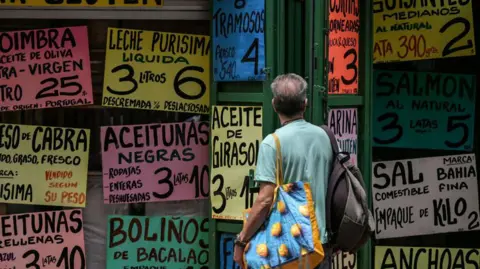 AFP
AFPVenezuela’s 25-year-old Bolivarian Revolution — the name the late President Hugo Chávez gave his political movement — has promised much, but has yet to deliver what the country needs most: a broad-based economy.
Instead of diversifying away from the oil industry, the governments of Chávez and Maduro have focused on Venezuela’s mineral resources.
With little regard for the future, they treat PDVSA as a cash cow, milking money to finance social spending on housing, health care and transport.
But at the same time, they have neglected to invest in maintaining oil production levels that have fallen sharply in recent years — partly, but not entirely, because of US sanctions.
These issues are clear. when President Chávez died in 2013But the situation worsened under his successor.
“Under Chávez, Venezuela was able to benefit from the oil boom until the global financial crisis,” said Mr. Tuvey.
“Fifteen to 20 years ago, Venezuela was a major oil producer. It used to produce three and a half million barrels a day, on par with some of the smaller Gulf countries.
“Today, the oil industry has been completely gutted and production is down to less than one million barrels per day.”
GDP has fallen rapidly, down 70% since 2013. But Mr Maduro has resorted to offsetting low oil prices by printing money to finance spending, leading to hyperinflation that the country has only recently managed to contain.
Economic hardship has taken its toll on Venezuelans, with more than 7.7 million people emigrating in search of a better life – about a quarter of the population.
But for those left behind, there are signs of improvement. While the bolívar remains the official currency, informal dollarization has taken place, with the US dollar increasingly becoming the payment method of choice for retail transactions – at least for those who can access it.
That stabilized the economy — but also came at a social cost.
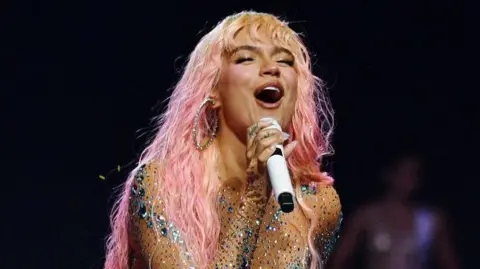 beautiful pictures
beautiful picturesPeople in the capital Caracas now find themselves in a two-tiered economy. While US dollars are fueling a consumer boom in high-end stores and restaurants, those paying in bolívars feel increasingly excluded.
One iconic event that highlighted these changes was the recent appearance of Colombian reggaeton superstar Karol G in Caracas during her current world tour.
Few major artists perform in Venezuela these days, but she had no trouble selling out two shows in March at the 50,000-capacity Estadio Monumental stadium, despite ticket prices ranging from $30 to $500 (£23 to £390).
At the same time, according to the Caracas-based consultancy Ecoanalítica, about 65 percent of Venezuelans earn less than $100 a month, while only eight or nine million of the country’s 28 million people can be considered consumers with real purchasing power.
“People who have very close ties to the regime or PDVSA are largely unaffected by all of this,” said Mr. Tuvey.
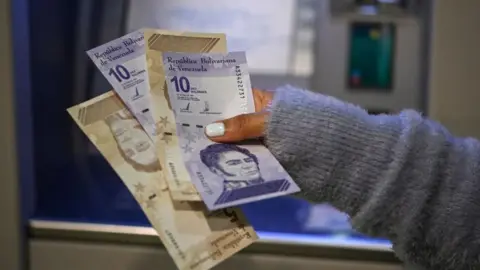 AFP
AFPBesides the need to raise living standards and reduce inequality, another major economic challenge for Venezuela is what to do about its huge foreign debt.
The country owes an estimated $150 billion to bondholders and other foreign creditors. The country has been in partial default since 2017, and despite Mr. Maduro’s repeated promises talk about restructuringNo events have taken place yet.
The issue is further complicated by the fact that some of the bonds were issued by PDVSA using U.S. refiner Citgo as collateral, so bondholders could pursue the matter through New York courts.
Bruno Gennari, emerging markets strategist at investment bank KNG Securities, told the BBC that because the US did not recognise Mr Maduro as president after the 2018 election, Venezuela was in a “crisis of legitimacy”.
This means that whoever wins Sunday’s election must be accepted by Washington if it is to proceed with a US-approved debt restructuring.
Mr Gennari did not rule out the possibility that the US “could turn a blind eye” if Mr Maduro wins re-election under unclear conditions, but he believes that is unlikely.
“This election will have a significant impact on the future of Venezuela. If the restructuring can take place, we could see the beginning of a very complex recovery process,” said Mr. Gennari.
Once the richest country in South America, Venezuela may now be on the road back to stability – but whatever happens, its economic glory days are long behind it.


